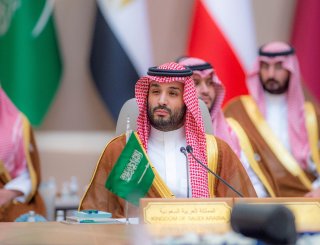Mohammed bin Salman Has Forged a Third Way for the Arab World
Saudi Arabia now has a leader whose ambition to lead the kingdom and the Arab world is not predicated on a patron-client relationship with the United States.
Rarely an Arab leader has had the support of the most populous Arab state, Egypt, which had set the tone of Arab politics; the Hashimite Kingdom of Jordan, which has upheld the religious-political dividends of representing the prophet’s family; and Iraq, the seat of the Abbasid dynasty, which served as the capital of Arab dynastic power. Rallying around the Saudi crown prince, Arab leaders have reached an understanding that Arab revival, unity, and influence cannot be achieved without regional stability and prosperity. They fully agree with MBS’ view that the Ukraine crisis has offered the Arab world an opportunity not only to revive the strategic importance of the Middle East but also to benefit from being at the middle of the unfolding global fault line pitting the Western world against Russia and China. Washington has run amiss in how its Ukraine policy has helped shape a new world order.
From a Middle Eastern vantage point, the Ukraine crisis is leading to the creation of three world camps: a Western camp, led by the United States; a non-Western camp, led by Russia and China; and a non-committed camp in the middle. In the middle camp, the Arab world finds itself close to the United States but not ready to be part of a Western alliance targeting Russia or China or boxing them out from the Middle East. They are already there. Yet, on the other hand, the Arab world is maintaining and enhancing its cooperation and trade with Russia and China without endorsing their revanchist policies.
It follows from this that in as much as Arab leaders worry about Iran’s aggressive regional behavior and military build-up, including its nuclear program, they worry about a potential catastrophic regional war. They would like to be part of a regional coalition deterring Iran but not part of an anti-Iran axis targeting Tehran. They would like to balance their relationships without plunging the region into a catastrophic war, decapitating their political and economic ambitions. Asked about an anti-Iran alliance to counter Tehran's regional activities, Anwar Gargash, the political adviser of the leader of the UAE, swiftly responded: “A Middle East NATO was a ‘theoretical’ concept and that for Abu Dhabi confrontation was not an option. … We are open to cooperation, but not cooperation targeting any other country in the region and I specifically mention Iran."
Arguably, Washington has been incorrectly reading the political map of the Middle East, especially since the Ukraine crisis. No less significant, Washington has underestimated the repercussions and ramifications of its policy vis-à-vis Russia for the international community. Biden’s recent trip to Jeddah is a step in the right direction for reinforcing American-Arab relations and easing inflation and gas prices globally. However, the United States is far from achieving its objectives of pushing Russia and China out of the Middle East or creating an anti-Iran alliance. This was clearly stated in the final statement of the Jeddah summit, which focused on putting the Arab house in order, maintaining regional stability, enhancing Arab prosperity and political influence, resolving outstanding regional conflicts through diplomacy, and building up Arab military deterrence. Moreover, the underlying message of the summit and the statement is that the Arab world now has a leader, Mohammed bin Salman, whose ambition to lead Saudi Arabia and the Arab world is not predicated on a patron-client relationship with the United States.
As one astute Arab observer told me: “Washington never ceases to shoot itself in the foot, but today it shot itself in the hip. What kind of a policy is it pursuing, sanctioning, and trying to defeat the largest country in the world … in a world competing for natural resources and sliding into multi-polarity? The Arab world, despite its problems and flaws, is not blind to what’s happening!”
Robert G. Rabil is a professor of Political Science at Florida Atlantic University (FAU). Follow him on Twitter @robertgrabil. The views expressed in this article do not necessarily reflect those of FAU.
Francois Alam is an attorney at Law and Secretary General of the Christian Federation of Lebanon and the Levant. Follow him on Twitter @francoisalam.
Image: Reuters.

